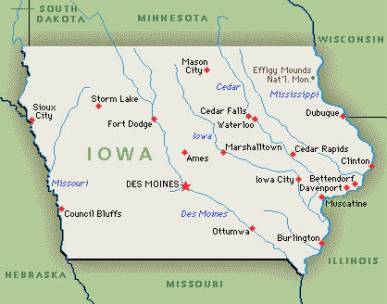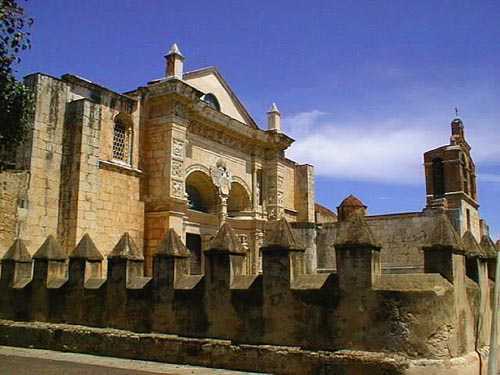
Dominican Republic RPCV Wendy Walker helps helps the Iowa Department of Economic Development
Center offers foreign visitors business help
By JERRY PERKINS
Register Farm Editor
09/27/2002 Alleman, Iowa. - Hunched over a computer in the International Business Center at the Farm Progress Show, Alberto Souto of Industrias John Deere Argentina moaned as he saw 60 messages in his e-mail inbox.
Helping Souto with his electronic-mail chores was Wendy Walker, small business air quality liaison for the Iowa Department of Economic Development.

Wendy Walker, a native of Red Oak, was a Peace Corps volunteer in the Dominican Republic from 1993 to 1995 and was happy to put her Spanish fluency to work.
Thanks to the Iowa Department of Economic Development, sponsor of the International Business Center, Souto and more than 280 visitors from two dozen foreign countries could find a translator, check their e-mail or access a list of Iowa export businesses.
Visitors also could munch on popcorn and soy nuts grown in Iowa and listen to down-home banjo and guitar picking by Bob and Kristie Black of Cedar Rapids.
This was Souto's 10th trip to the annual Farm Progress Show, which ended Thursday.
He brought with him 16 other Argentinians, including two agronomists who do business with John Deere in Argentina.
Luis Fossate, who works for a farmers' cooperative in southern Argentina, said the Farm Progress Show allows him to compare the level of technology in the United States with what is available in Argentina.
"We look for what we can adapt to our region," said Fossate, who was making his second trip to the United States and his first to Iowa.
C.J. Niles, director of the Iowa Department of Economic Development, said the International Business Center was a way to connect Iowa with the world of international trade.
"It gives our foreign visitors and Iowa a chance to renew old friendships and make new ones," Niles said. "It reinforces the fact that Iowa is an international state."
Iowa exported $3.4 billion in agricultural commodities last year, which represented 7 percent of the United States' agricultural exports and ranked Iowa No. 2 behind California in farm commodities exported.
Manufactured goods and value-added food products exported from Iowa last year totaled $4.6 billion, Niles said.
"International business is more important than ever to Iowa," Niles said. "Our business development efforts have to be global."
Farm Progress Show
Here's what some foreign visitors to the Farm Progress Show had to say about it:
Agris Smuksta, a farmer from Latvia: We have similar shows twice a year in Latvia, but nothing on this scale. In two days I have only seen half of the show. The size of the machinery is so much bigger than what we have. I was most impressed with a tractor that is guided by a global positioning system and a computer.
Geraldo Slob, a farmer from Parana, Brazil: It's big. I am looking for information about global positioning systems and precision agriculture. I expected more technology demonstrations.
Agim Deshishku, owner of a business in Kosovo that imports fertilizer and crop seeds: I have a good impression of the show. I saw big tractors and combines and sprayers. The crops are very tall and everything looks beautiful. I saw some things here I would like to take back home, like narrower crop rows and different varieties of seed.
Sergio Dabdoub, a farmer from Sonora, Mexico: It's very informative, but it focuses more on the type of farming you have in the Midwestern U.S. It would be better if it represented agriculture from other parts of the U.S., too. We're interested in conservation tillage techniques on irrigated farmland, and there isn't much here about that.
Vitezslav Navratil, a farmer and president of a farm co-operative in the Czech Republic: I appreciated the field demonstrations of the farm machinery and seeing all the different kinds of equipment. This kind of exhibition is right for farmers because you get to see the equipment operating in real-life situations. I am very interested in soybean production, and I talked for 40 minutes with an Iowa State University agronomist.
Jorge Di Luca, an agronomy engineer from Tres Arroyos, Argentina: This show has the highest level of technology we have seen. It's not yet available in Argentina.
